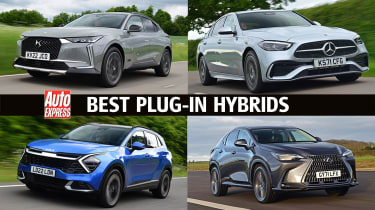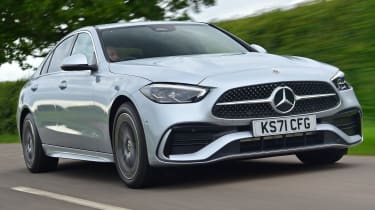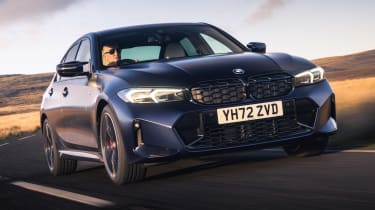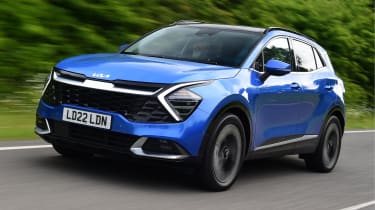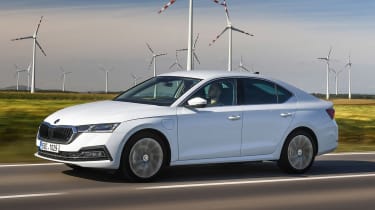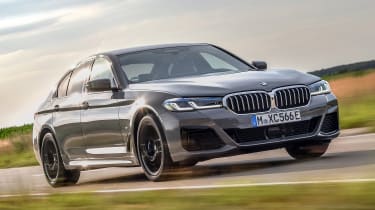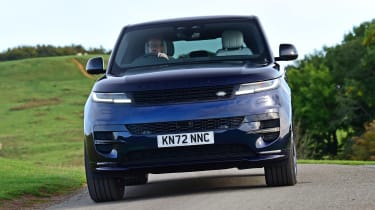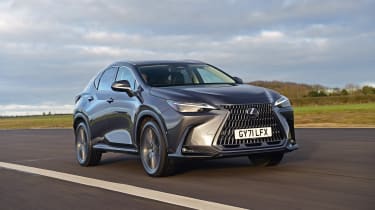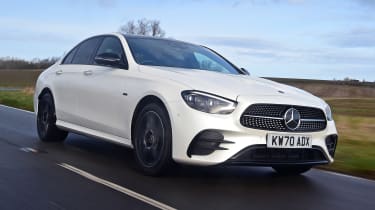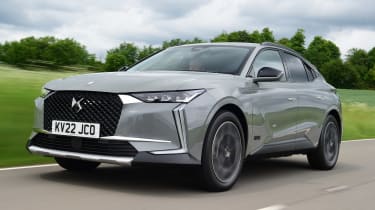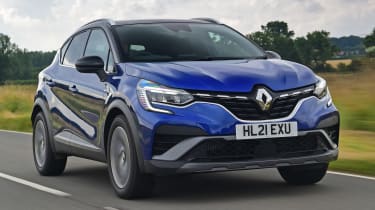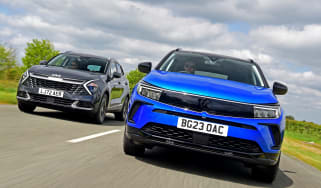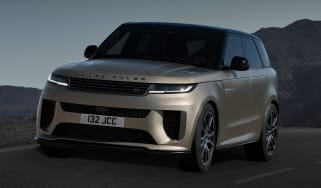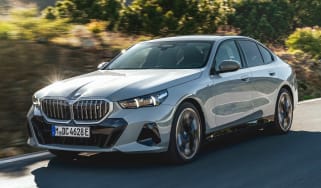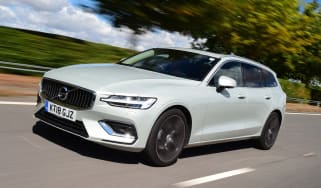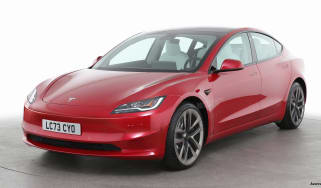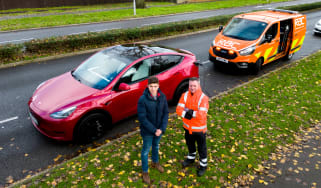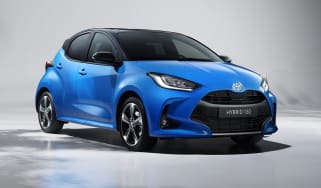Top 10 best plug-in hybrids to buy 2023
The plug-in hybrid market has grown exponentially in recent years. Here are our electrified favourites
Not everyone is ready to take the plunge with a full-electric vehicle, which makes plug-in hybrids (PHEV) a great ‘stepping stone’. What’s more, with many manufacturers joining the PHEV arms race, there’s now a huge array of models to choose from in a variety of formats - whether you want a SUV, saloon, estate or hatchback, there’s an option out there for you, as our list of the best plug-in hybrids to buy confirms.
There are lots of reasons to make the switch from internal-combustion-engined cars to hybrid, whether you’re looking to lower your carbon footprint, take advantage of government incentives, lower tax rates, or just prefer the drive of a plug-in hybrid car.
The sheer variety of vehicles that now offer plug-in hybrid ability means there are PHEV options to suit buyers from a range of markets. It also means that buyers have a tougher time than ever choosing the best plug-in hybrid car for them. On this page we aim to help by explaining the market and delivering our verdicts on the best plug-in hybrids you can buy.
So which PHEVs do we recommend? With so many now on offer, we can bring you a top 10 of the best options, just scroll down to see our favourites.
Best plug-in hybrid cars
- Mercedes C 300 e
- BMW 330e
- Kia Sportage PHEV
- Skoda Octavia iV
- BMW 545e xDrive
- Range Rover P440e
- Lexus NX 450h+
- Mercedes E 300 e and E 300 de
- DE 4 E-Tense 225
- Renault Captur E-Tech PHEV
1. Mercedes C 300 e
- Price: £48,710
- Range: 65-68 miles
- Economy and emissions: 403.6-470.8mpg/14-15g/km
The Mercedes C-Class is a great executive saloon that majors on comfort, refinement and sophistication. It might not be quite as sporty as some rivals such as the BMW 3 Series and Jaguar XE, but it feels more special inside. That's especially true for the PHEV, which is serene while being powered along by its 127bhp electric motor.
And to answer the naysayers who think plug-in hybrids don't go far enough on a charge, Mercedes has fitted a 25.4kWh battery – that's larger than the one in the original Nissan Leaf. It's enough juice to give the C 300 e an official EV range of more than 60 miles, making 40-50 miles of zero-emissions driving realistic in most conditions. Crucially, that's not only more than enough for most people's daily driving, but it can also take a good bite out of longer trips as well.
The electric motor is paired with a 2.0-litre four-cylinder petrol engine, offering 201bhp, for a combined total of 308bhp. It's reasonably brisk, getting from 0-62mph in 6.1 seconds, but the C 300 e only really feels sporty in a straight line. The engine is quiet when it kicks in though, and easily drowned out by the Burmester hi-fi.
One of the few downsides is the price - this has recently gone up quite significantly, as with a lot of Mercedes models, meaning you’ll pay nearly £50,000 even before options and/or packs are added.
2. BMW 330e
- Price: £44,880
- Range: 34-37 miles
- Economy and emissions: 176.6-217.3mpg/30-38g/km
Since the BMW 3 Series is already a top choice among families and company car drivers, a plug-in hybrid version was always going to be a logical step. BMW intended to launch the current-generation car as a plug-in from the start, so the platform was developed with the powertrain in mind.
As a result, there’s little impact on passenger space, but boot capacity does shrink to 375 litres compared with the standard saloon’s 480 litres. If you need more space, it’s worth noting that, unlike the previous generation, the 330e is now also available in Touring estate guise for the first time. Plus, a recent facelift means the 330e is better than ever, even if it’s a little annoying to see the climate controls migrate to the new touchscreen infotainment system.
As has been the case throughout the current-gen version’s life, key to the BMW’s appeal is its excellent chassis. Sure, the PHEV powertrain adds extra weight, but the 3 Series still handles well and the ride is supple.
Company car buyers will enjoy low running costs, thanks to 37g/km emissions. BMW claims 36 miles is possible on electricity alone, and It takes five and a half hours to charge from a three-pin socket.
3. Kia Sportage PHEV
- Price: £39.995
- Range: 43 miles
- Economy and emissions: 252mpg/25g/km
There was a time when spending more than £40,000 on a Kia would have seemed ludicrous, but the Sportage PHEV truly justifies its cost with great refinement, a strong tech offering and even some style. And in any case, for company car choosers, the electrified Sportage will prove a very affordable option, with its 43-mile electric-only range and 25g/km CO2 figure sneaking it into the eight-per-cent Benefit-in-Kind tax band, something the closely related Hyundai Tuscon PHEV hasn’t managed.
An electric motor, a 13.8kWh battery pack and a 1.6-litre inline-four petrol engine blend well to give decent, if not hugely brisk straightline performance, with a 261bhp output getting the relatively heavy Sportage from 0-62mph in 8.2 seconds.
As with all versions of the Sportage, the interior is one of the car’s real highlights. Two 12.3-inch displays - one housing the excellent infotainment system, the other a digital instrument cluster - are placed side-by-side to give the impression of a single unit, while the material quality is excellent.
4. Skoda Octavia iV
- Price: £28,400-£38,520
- Range: 34 miles
- Economy and emissions: 217.3-282.5mpg/22-30g/km
With more space than rivals, lots of thoughtful features and a comfortable interior, the Skoda Octavia is one of our favourite cars. For the first time, this generation is also available with plug-in power, courtesy of a powertrain familiar to Volkswagen Golf GTE owners.
A 1.4-litre turbo petrol engine and small electric motor team up to produce 201bhp and 350Nm of torque. It's enough for a respectable 0-62mph time of 7.8 seconds, but the Octavia iV's 34-mile EV range is the more important figure. This means the Skoda can slip four adults and all their luggage in and out of the city with virtually no tailpipe emissions.
Official figures are 282mpg and 22-33g/km of CO2, which are sure to appeal to company-car drivers on the hunt for low Benefit-in-Kind liability. Bills are around half those of an equivalent Octavia with a 1.5-litre petrol engine.
We found 30 miles is easy to achieve in all but freezing weather, and recharging the battery takes just over three hours using a wallbox. That should make it easy for most owners to start the day with a full EV range, or even top-up at work for the drive home.
One thing we should note is Skoda had at the time of writing temporarily removed this car from sale due to an order backlog, so if you want one, some patience may be required.
5. BMW 545e xDrive
- Price: £61,345
- Range: 29-34 miles
- Economy and emissions: 128.4-166.2mpg/39-51g/km
BMW already had a PHEV version of its excellent 5 Series, badged 530e, but the arrival of a six-cylinder petrol engine in its 545e xDrive plug-in makes for an even more impressive machine. Not only is it more powerful – with a combined 387bhp and 600Nm of torque – but the silky-smooth 3.0-litre petrol also makes the transition between electric and internal-combustion power seamless.
The 11.6kWh battery is a lot smaller than the C 300 e offers, but it's still enough to get the BMW 33 miles on electric power. It also boosts its fuel-efficiency figure to 166mpg and, critically for the executive class, cuts CO2 emissions to around 40g/km.
One advantage of a smaller battery is the weight saving, because unlike a lot of PHEVs, the 545e xDrive is still an impressive car from behind the wheel. It feels like a balanced, agile saloon, with carefully tuned damping to ensure excellent body control without an overly firm ride. There's even a tuneful growl from the engine under acceleration.
6. Range Rover Sport P440e
- Price: £99,215
- Range: 70 miles
- Economy and emissions: 338.3mpg/18g/km
It’d be tempting to put the plug-in hybrid version of the sensational new Range Rover Sport on this list, but its Range Rover Sport sibling is very nearly as luxurious while also being cheaper and slightly sharper to drive.
As is the case for the full-fat Rangie PHEV, the plug-in Range Rover Sport pairs a 3.0-litre in-line six petrol engine with a whopping 38.2kWh (31.8kWh useable) battery pack. This gives an impressive theoretical electric-only range of up to 70 miles according to lab results, although we’d expect more like 50 miles in real-world conditions.
The PHEV can be specced in two states of tune - the P510 is good for 503bhp and 700Nm of torque, making for a 0-62mph time of 5.4 seconds, while the P440e makes do with a still healthy 434bhp which provides a 5.8-second 0-62mph figure. Be warned, though, while less expensive than a ‘proper’ Range Rover, this is far from a cheap car. Even the less powerful P440e starts at nearly £100,000, and most will be well beyond that mark once options are chosen.
7. Lexus NX 450h+
- Price: £53,300
- Range: 40 miles
- Economy and emissions: 256.8-313.9mpg/21-25g/km
This plug-in hybrid version of the NX is mechanically very similar to the Toyota RAV4 PHEV, sharing its 2.5-litre four-cylinder petrol engine, two motors and 18.1kWh battery pack. The Lexus is worth the premium, however, partly thanks to its wonderful interior.
The cabin offers a very different, arguably more classy space than German rivals, and the new infotainment setup is a big step forward from the arrangement that came before with its awkward-to-use trackpad controller. It’s a smart-looking car from the outside, too.
The engine, motors and battery come together to produce a punchy 305bhp, which is enough to whisk the NX from 0-62mph in just 6.3 seconds. Meanwhile, an electric-only range of up to 40 miles allows the SUV to slip into the eight per cent Benefit-in-Kind tax bracket. And once the battery is empty, the NX tends to be much more economical than many comparable PHEVs run the same way.
8. Mercedes E 300 e and E 300 de
- Price: From £57,225
- Range: 31-35 miles
- Economy and emissions: 176.6-217.3mpg/33-36g/km
Mercedes offer the E-Class as a plug-in hybrid with either petrol in the case of the E 300 e or diesel in the E 300 de. The latter of which is one of the very few diesel hybrids you can buy but it’s still a corker with up to a claimed 217.3mpg on offer - although real-world consumption will likely be less. The petrol E 300 e is pretty frugal too, with up to 188mpg available on the combined cycle.
The E 300 e isn’t as well-rounded as a BMW 530e when it comes to handling, although with 316bhp and 700Nm in the revised E 300 e, there’s plenty of power. Acceleration from 0-62mph is dealt with in 5.9 seconds and it’ll march on to a top speed of 155mph. The upside to the slightly inert handling is supreme ride quality. Its comfortable nature suits the hushed powertrain, making the E 300 e a fine long distance cruiser.
Starting at nearly £60,000 after recent range-wide Mercedes price rises, the E 300 e doesn’t come cheap, but like most other hybrids on this list - you’ll soon start recouping that extra outlay if you can plug it in regularly.
9. DS 4 E-Tense 225
- Price: £42,200
- Range: 31-35 miles
- Economy and emissions: 183-217.3mpg/30g/km
One of our biggest twin test shocks of decent times happened when a DS 4 E-Tense 225 beat Audi’s A3 TFSI e. While strong discounts for the DS counted in its favour, a big factor in its victory was its better-resolved plug-in hybrid powertrain.
That setup combines a 1.6-litre inline-four engine with a 12.4kWh battery pack with a 107bhp motor to give an electric-only range of up to 33.5 miles. The total system power is 222bhp, which gives strong performance - the DS 4 225 will go from 0-62mph in 7.7 seconds, on to a top speed of 145mph.
We also like the DS 4 because it’s comfortable, stylish, has an interesting cabin design, and is just nicely different to more conventional rivals. It’s taken a while, but finally, Citroen’s offshoot is finally starting to find its groove.
10. Renault Captur E-Tech PHEV
- Price: £31,995
- Range: 31 miles
- Economy and emissions: 188.3mpg/34-35g/km
The Captur is one of our favourite small SUVs, thanks to its handsome looks, well-designed interior and plenty of space. In fact, despite being based on the Renault Clio, the Captur can seat four adults in comfort, with a clever sliding bench that can adjust boot space. Compromise slightly on knee room and boot space is among the best in class.
The E-Tech Plug-in is powered by a 1.6-litre petrol engine and two electric motors, fed by a 9.8kWh battery. A combined 158bhp makes it the most potent Captur available, and official testing shows it can drive for up to 31 miles without the petrol engine chiming in. It's worth noting, however, that during our test in winter we could manage only 19 miles before a top-up.
That doesn't affect its low 34g/km CO2 figure, which makes this Captur a lot cheaper for business users to run than the petrol or diesel version. VED (road tax) is also at a slightly reduced rate, and with fuel consumption of up to 188.3mpg, trips to the filling station should be a lot less frequent.
The car comes with a free set of charging cables, and as with all Renault models there’s a five-year warranty, as well as eight-year cover for the battery
Should you buy a plug-in hybrid?
Plug-in hybrids are proving popular for a number of reasons. As technology improves and more car makers join the fray, the price you pay for a plug-in vehicle is gradually coming down. Then there are the tax implications, with many plug-ins offering lower VED road tax rates than their combustion counterparts. Benefit-in-Kind rates for company car users are also lower, thanks to low emissions.
A close second to the low running costs is the fact that this hybrid kit doesn't require you to compromise on the way you use your car. The key is to remember to plug the car into a charging point wherever possible to maximise the amount of electric running you do, but if you can’t charge the car just reverts to its internal-combustion engine. If you think of your car like a smartphone, and get into the habit of plugging it in overnight to charge, then you'll soon see the lower costs that electric driving can bring. Failing to keep the battery charged will likely see economy drop to potentially worse levels than an equivalent non-hybrid model.
If you’re thinking of making the switch to electric, read our list of the best electric cars to buy.

